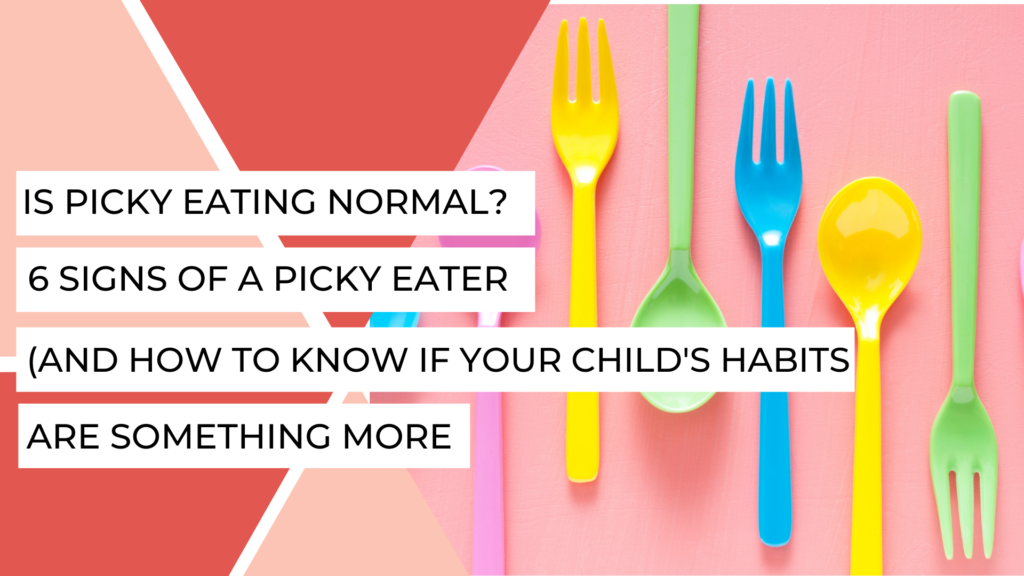This article answers several questions about picky eating:
- is picky eating normal
- why does picky eating happen
- when does picky eating start
- how to know if your child’s picky eating is normal
- and how to know if your child’s picky eating is more extreme

As a new mom and a dietitian who loves to cook almost as I love to eat, starting to feed my son was a milestone.
I cried when he competently grabbed the spoon from my hands and took his first bite.
A few months into his eating, I’m proud by how he gobbles up absolutely everything I offer him. I love when his meal covers his entire body and that he starts dancing the minute he realizes it’s time for the high chair.
Even as I’m having so much fun in his early feeding days I’m anticipating what is likely coming.
There will be a day soon when my son’s appetite wanes. I know that the bold flavors he loves now have a short shelf life and that in just a year or two there’s a high chance that he will become skeptical of the many foods he currently loves.
Nothing special is going to happen. He’s just going to grow up. And a normal part of kids growing up is experiencing a change in what and how they eat.
Is Picky Eating Normal?
As many as 75% of parents say that their child is or has been a picky eater. And even more report that their child is “sometimes” picky.
Though “picky” means something different to every parent, it’s clear that picky eating is common. More than that, picky eating is actually considered a normal phase of child development that children naturally grow out of.
Why Does Picky Eating Happen
Picky eating can occur for a number of reasons.
One large reason for picky eating is a change in nutritional needs. As children grow from babies to toddlers they actually experience a decrease in nutritional needs. That is one reason why kids start to eat less. Many parents find this alarming, but it is actually normal.
Another possible reason for picky eating is increased independence. We tend to see picky eating tendencies around that time that toddlers realize they can say no and voice opinions.
Adding to that, it’s possible that picky eating is an evolutionary hangover. When children gained more independence, it meant they would encounter potentially dangerous foods. Being skeptical of new foods and having a distaste for bitter flavors (the taste of poisonous foods!) was once a protective mechanism and is now the bane of many parents’ mealtimes.
At What Age Does Picky Eating Start
Picky eating habits tend to start showing up when a child is around 2 years old, however, many parents notice signs of picky eating starting closer to 18 months.
How to Know If Your Child’s Picky Eating is Typical Picky Eating
It’s normal to feel concerned about your child’s eating, especially when you notice a change that results in LESS – less food, less variety, less hunger. The question of “is picky eating normal” is one that most parents wonder at some point.
And most picky eating is in fact normal, which means that is a typical developmental phase that they will naturally outgrow.
Is picky eating normal? Here are signs of typical picky eating:
- Preferring plain foods
- Eating less than they used to
- Not wanting to try new foods
- Rejecting vegetables
- Avoiding mixed dishes and sauces
- Expressing preferences about brands and preparations
How to Know If Your Child’s Picky Eating is More Than Typical Picky Eating
Some children experience greater barriers to eating. What originally looks like picky eating can evolve to become something more severe. It’s difficult to clearly distinguish what behaviors are simply “picky” and which might be signs of a more severe eating struggle because there is no formal definition for any type of eating struggle.
This is sometimes referred to as extreme picky eating. While there’s no set definition, there are common traits that can distinguish typical picky eating from something more.
Here are some signs that your child might be experiencing something more than typical picky eating:
- Extreme unwillingness to taste new foods
- Distress about non-preferred foods
- Parent or child concerns about what the child will eat out of the house
- Limited number of accepted foods
- Not eating at least one food from all food groups
While most children outgrow picky eating, extreme picky eaters often need more support to comfortably eat a variety of foods. If you’re concerned that your child’s eating habits are something more than picky eating, consider getting support. Speak to your child’s doctor, learn more about extreme picky eating, or seek out a professional.
Recap
Picky eating is a normal phase of child development and most parents report seeing picky eating habits in their child at some point. Most children will outgrow picky eating, but some children experience more severe eating struggles.




0 Comments